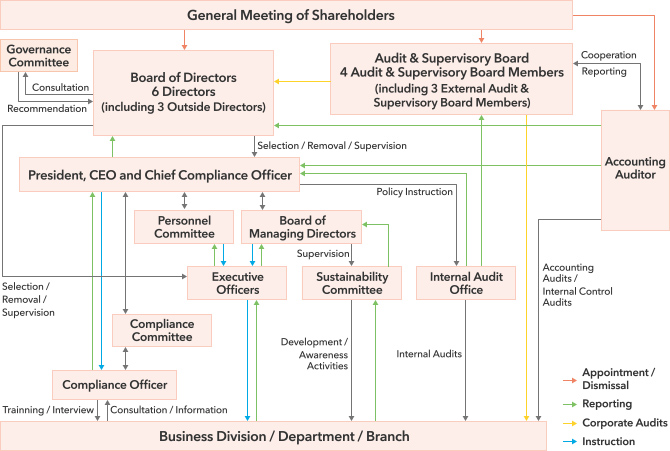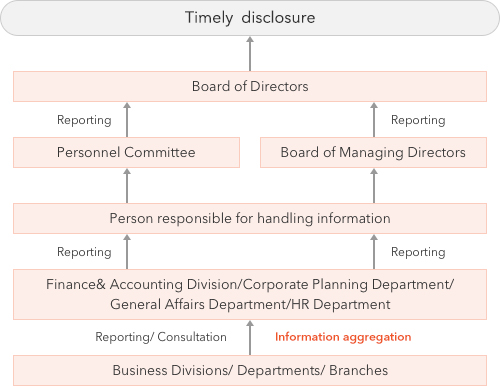Basic policy
Kanro makes it a basic policy to ensure business transparency, guarantee sound management practice, and increase management efficiency. It works to enhance corporate governance by placing priority on strengthening the functions of its Board of Directors and Audit & Supervisory Board, strengthening functions to prevent illegal acts, disclosure, and being accountable to its shareholders. In order to realize this, Kanro has adopted the structure of a company with an Audit & Supervisory Board and maintains strong management oversight functions by electing Outside Directors and Outside Audit & Supervisory Board Members that satisfy the requirements for independent officers, in addition to introducing an Executive Officer system and working to accelerate and increase the efficiency of decision making and the execution of business.

The evaluation of the effectiveness of the Board of Directors
- (1)Analysis & evaluation process
- In evaluating the effectiveness of the Board of Directors, along with input from a third party, we conducted a self-assessment questionnaire with all Directors and Audit & Supervisory Board Members, to analyze and evaluate the effectiveness of the Board of Directors.
- (2)Summary of evaluation results
- As a result of the evaluation, while the effectiveness of the Board of Directors was confirmed, several issues were raised, including the need for expanded discussions about matters relating to the improvement of the Company’s medium- to long-term corporate value, such as medium- to long-term management strategies, and governance. The process also highlighted the need for ongoing consideration of the skillsets and diversity of Directors. Looking forward, we will take measures to improve these issues and strive to further enhance the functions of the Board of Directors.
Summary of the Information Disclosure System
The Company conducts information disclosure as follows.
- 1. Types of disclosed information
- The Company discloses facts and decisions required to be disclosed in a timely manner by the Tokyo Stock Exchange (hereinafter, “timely disclosure information”), information disclosed under the Companies Act and the Financial Instruments and Exchange Act, and other similar information in compliance with the following principles.
- 2. Basic disclosure policy
- We strive to ensure timely and accurate disclosure of information to all stakeholders, including shareholders and investors, in line with our commitment to transparency, fairness, and continuity. The information disclosed includes both the financial data, such as the Company’s financial position, operating results, and the non-financial data, such as information about management strategy and management issues, risks, and corporate governance.
- 3. Disclosure System
- The Company’s internal system regarding information disclosure is as follows.

(a)Timely disclosure
The Chief Financial Officer (CFO) is responsible for the handling of information, while the Finance & Accounting Division (Accounting Department) acts as our contact point for timely disclosure. We are constantly working to raise awareness of the importance of timely disclosure within the Kanro organization. We have also established a system that allows officers and employees to report to the Accounting Department immediately and seek advice about any events or decisions in the organizations to which they belong that are seen as likely to have a significant impact on decisions by investors. Decisions by the Board of Directors, Board of Managing Directors, and Personnel Committee are reported directly to the CFO. Information about events occurring in corporate headquarters, plants, or other offices is aggregated by the Corporate Planning Department, General Affairs Department, HR Department and Accounting Department and reported to the CFO. The CFO then determines whether timely disclosure is required and implements the necessary disclosure measures after consulting within the Company.
(b)Important information other than timely disclosure information, as stipulated in laws and regulations, etc.
The units responsible for such information implement disclosure as required by laws, regulations, and rules, after consultation and deliberations involving other related units, and after deliberations within the Company about the appropriateness of the information to be disclosed.


